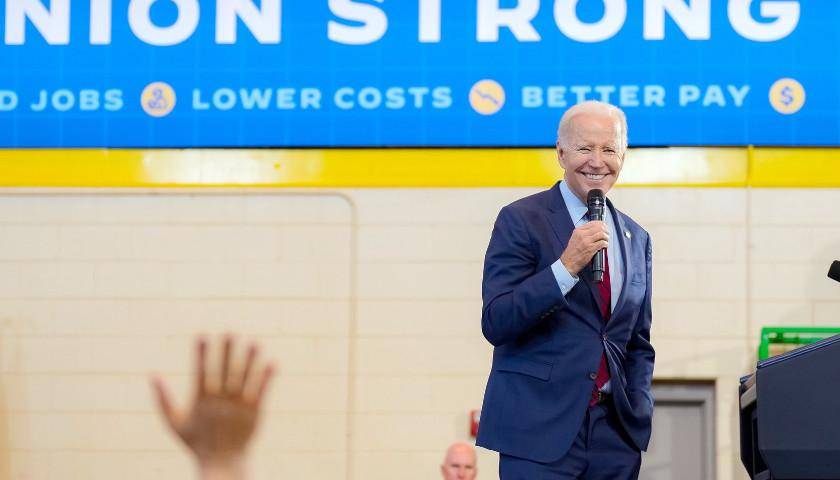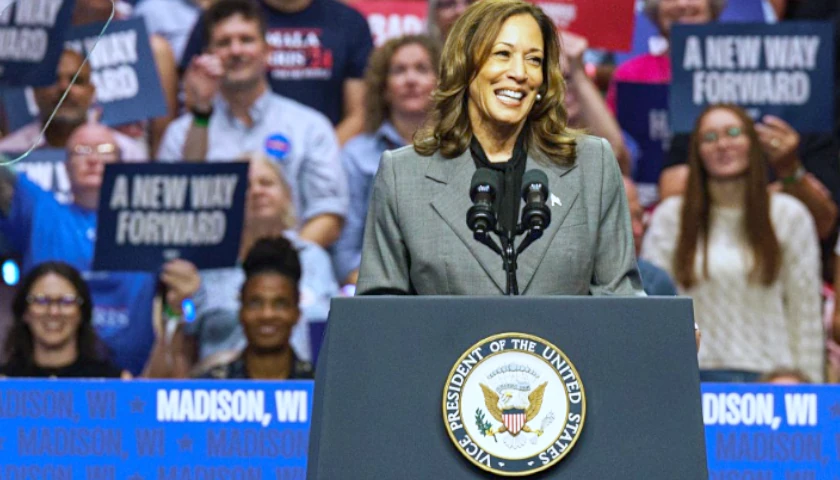by Robert Romano
Another week, and amid more calls for President Joe Biden, who just turned 82, to step aside, former President Donald Trump is extending his lead in national polls over Biden for the 2024 election, with 46.6 percent for Trump to 45 percent for Biden in the latest average of polls taken by RealClearPolitics.com.
That’s bad news for Biden, as only three polls taken the entire cycle show him even hitting 50 percent or above out of 187 polls taken. Of the polls, Biden has led just 75 of them, with Trump leading 87 of them. The rest were tied.
Compared to the 2020 cycle, when 293 polls were taken, Biden led 285 of them, and hit 50 percent 174 times.
That’s quite a difference, and it’s less than a year out. Biden should be way ahead, but he isn’t.
At this point in the cycle in 1980, for example, Gallup had Jimmy Carter up over Ronald Reagan by 30 points, and yet Reagan a year later won easily in a landslide, 51 percent to 41 percent, and winning 44 states.
Going back over the elections where incumbent presidents stood for election, only 1948 and Harry Truman stands out as a time when an incumbent president was consistently losing in polls but then went on win fairly easily, 49.6 percent to 45 percent, and winning 28 states.
Otherwise, it’s a very consistent track record where incumbent presidents tend to lead polls and go on to win. Barack Obama led the polls consistently in 2012, as did George W. Bush in 2004, Bill Clinton in 1996, Ronald Reagan in 1984, Richard Nixon in 1972, Lyndon Johnson in 1964, Dwight Eisenhower in 1956, and Franklin Roosevelt in 1936, 1940 and 1944.
Whereas, incumbents who ended up trailing in the polls during the election year itself, with the exception of Truman in 1948, all lost, including Gerald Ford in 1976, Jimmy Carter in 1980 (by June 1980, Reagan was began to overtake Carter in the polls), George H.W. Bush in 1992 and Donald Trump in 2020.
So, the reason many Democrats are frightened by Biden’s weakness in national polls, whether the reelection polls, or his approval rating, which stands at a low of 41 percent now on average, with 56 percent disapproving, is because they should be. The polls are real, and they believe them.
Additionally, age is a major issue in the campaign, with 67 percent in the latest Harvard-Harris poll taken Nov. 15 to Nov. 16 saying he’s too old to run again.
Another factor is that Trump has throughout his political career consistently underpolled from his actual support at the polls. In 2016, the RealClearPolitics.com average had Trump at 43.6 percent, but ended up winning the election with 46.1 percent of the popular vote.
And in 2020, the average had him at 44 percent but then he ended up with 47 percent of the popular vote and barely losing by 43,000 votes in Georgia (10,000), Arizona (10,000) and Wisconsin (23,000), nearly pulling off the same comeback Truman did in 1948.
The phenomenon is interesting enough, that is, when called, many Trump supporters conceal their support and was present in both 2016 and 2020. The current numbers therefore must be incredibly terrifying for the Biden campaign because it implies that Biden’s support has already peaked, and might even get worse from here, given certain exigent circumstances, for example, a recession.
Another factor is that replacing the incumbent hasn’t recently worked. When Harry Truman and Lyndon Johnson did not stand for reelection in 1952 and 1968, Republicans still won relatively easily. They could try, but Dems’ argument still becomes “The country got so bad we had to replace the president. Would you still vote for us?” It’s a show of weakness.
Meaning the only thing worse for Democrats than Biden might be if anyone else were to run. They might try, but they might also end up offering someone else up who might have even less chance of winning and who showed up almost nowhere in Democratic presidential primary polls, of which Vice President Kamala Harris consistently led as a second choice in the RealClearPolitics.com average and when Biden was excluded from the question.
Biden is the incumbent and he’s well below 50 percent in the polls a year out. Now, it could be the Democratic political machine can still get its base out to vote one way or another in 2024 and the election will still be quite close. A lot can change, but at 82 years old, Biden’s in trouble. Happy birthday, Mr. President!
– – –
Robert Romano is the Vice President of Public Policy at Americans for Limited Government Foundation.




